|
|
The Holy Prophet Zacharias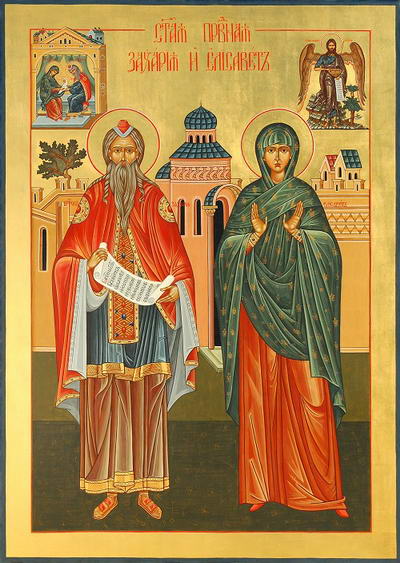 Father of St John the Forerunner, he was the son of Barachias, of the tribe of Aaron, a high priest in descent from Abia, and held the eighth degree of service in the Temple in Jerusalem. His wife Elisabeth was sister to St Anna, the mother of the holy Mother of God. In the reign of King Herod, the child-slayer, Zacharias was serving one day in his turn in the Temple in Jerusalem. An angel of God appeared to him in the altar, and Zacharias was afraid. But the angel said to him: "Fear not, Zacharias" (Luke 1), and informed him that his wife Elisabeth would bear a son in answer to their prayers, for Zacharias and Elisabeth were both old. When Zacharias doubted the words of the heavenly messenger, the angel told him: "I am Gabriel, that stand in the presence of God", and Zacharias was made dumb from that moment, and did not speak until his son was born and he had written on a tablet: "His name is John." Then his mouth was opened, and he glorified God. Later, when the Lord Christ was born and Herod began killing the children in Bethlehem, he sent men to find Zacharias"s son and kill him, for he had heard of all that had happened to Zacharias and how John was born. Seeing the soldiers, Elisabeth took John in her arms - he was eighteen months old at that time - and fled from the house with him to a rocky and desert region. When she saw where the soldiers had driven them, she cried out to the mountain: "O mountain of God, receive a mother with her child!", and the rock opened and hid the mother and child inside itself. Herod, furious that John had not been killed, ordered that Zacharias be cut down before the altar. Zacharias"s blood spilled over the marble and became as hard as stone, remaining thus as a witness to Herod"s wickedness. At the place where Elisabeth hid with John, a cave opened and a spring flowed forth, and a fruit-bearing palm grew up by God"s power. Forty days after Zacharias"s death, blessed Elisabeth also entered into rest. The child John stayed in the wilderness, fed by an angel and guarded by God"s providence, until that day when he appeared by the Jordan. Father of St John the Forerunner, he was the son of Barachias, of the tribe of Aaron, a high priest in descent from Abia, and held the eighth degree of service in the Temple in Jerusalem. His wife Elisabeth was sister to St Anna, the mother of the holy Mother of God. In the reign of King Herod, the child-slayer, Zacharias was serving one day in his turn in the Temple in Jerusalem. An angel of God appeared to him in the altar, and Zacharias was afraid. But the angel said to him: "Fear not, Zacharias" (Luke 1), and informed him that his wife Elisabeth would bear a son in answer to their prayers, for Zacharias and Elisabeth were both old. When Zacharias doubted the words of the heavenly messenger, the angel told him: "I am Gabriel, that stand in the presence of God", and Zacharias was made dumb from that moment, and did not speak until his son was born and he had written on a tablet: "His name is John." Then his mouth was opened, and he glorified God. Later, when the Lord Christ was born and Herod began killing the children in Bethlehem, he sent men to find Zacharias"s son and kill him, for he had heard of all that had happened to Zacharias and how John was born. Seeing the soldiers, Elisabeth took John in her arms - he was eighteen months old at that time - and fled from the house with him to a rocky and desert region. When she saw where the soldiers had driven them, she cried out to the mountain: "O mountain of God, receive a mother with her child!", and the rock opened and hid the mother and child inside itself. Herod, furious that John had not been killed, ordered that Zacharias be cut down before the altar. Zacharias"s blood spilled over the marble and became as hard as stone, remaining thus as a witness to Herod"s wickedness. At the place where Elisabeth hid with John, a cave opened and a spring flowed forth, and a fruit-bearing palm grew up by God"s power. Forty days after Zacharias"s death, blessed Elisabeth also entered into rest. The child John stayed in the wilderness, fed by an angel and guarded by God"s providence, until that day when he appeared by the Jordan.The Holy Martyrs Juventius and Maximus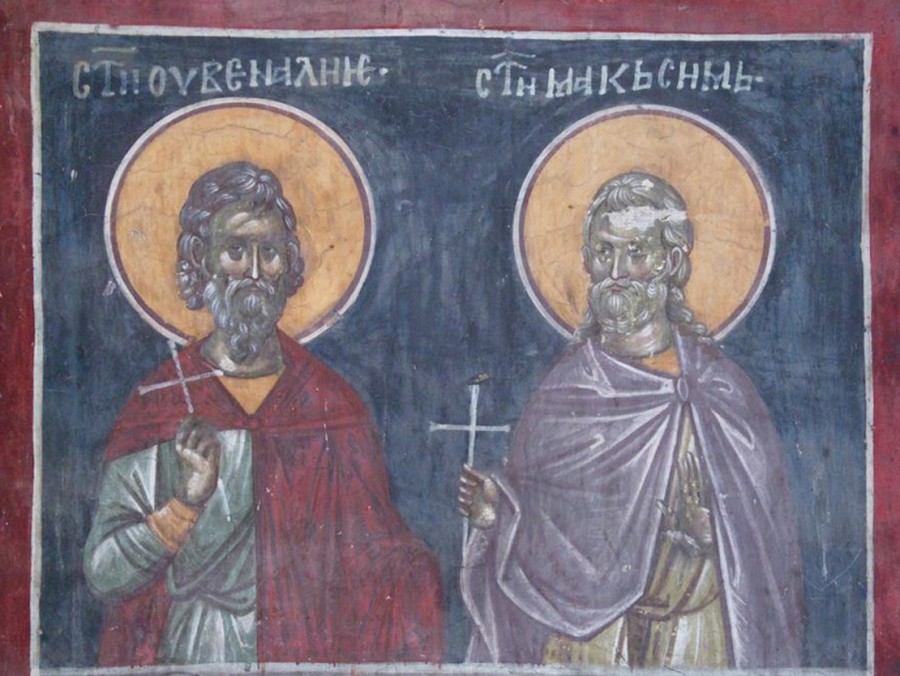 Little is known about the lives of these two holy men, but their suffering for Christ is known from a sermon in their praise by St John Chrysostom. They were soldiers in the time of the Emperor Julian the Apostate. In conversation at an army festival, they condemned the Emperor for his persecution of Christians. Someone told the Emperor of this, and he had them thrown into prison. Some of the Emperor"s men visited them, with the intention of turning them from the true Faith, telling them how many of their friends had denied Christ. To this, these great men replied: "We must therefore stand firm and with courage, and offer ourselves in sacrifice for their apostasy." They were beheaded with the sword under cover of darkness, but their relics were found and discovered to have wonderworking power. Little is known about the lives of these two holy men, but their suffering for Christ is known from a sermon in their praise by St John Chrysostom. They were soldiers in the time of the Emperor Julian the Apostate. In conversation at an army festival, they condemned the Emperor for his persecution of Christians. Someone told the Emperor of this, and he had them thrown into prison. Some of the Emperor"s men visited them, with the intention of turning them from the true Faith, telling them how many of their friends had denied Christ. To this, these great men replied: "We must therefore stand firm and with courage, and offer ourselves in sacrifice for their apostasy." They were beheaded with the sword under cover of darkness, but their relics were found and discovered to have wonderworking power.The Seventy Holy Martyrs of NicomediaTogether with Urban, Theodore and Medimnus, these men were chosen by the Christians of Constantinople in the time of Valens" persecution of Orthodoxy, to go as the most honoured and eminent citizens of Constantinople to Nicomedia and beg the Emperor (an Arian) to leave at least their lives to the Orthodox Christians. The Emperor was furious and told them to go back home, but secretly ordered the sailors to set fire to the ship when they got out to sea, and save themselves in a small boat. The wicked servants of their yet more wicked master did this. The bodies of these glorious seventy were burned and drowned in the sea, but their souls swam off to the of eternal blessedness.
St. Athanasius, abbot, of Brest, by the Latins (1649)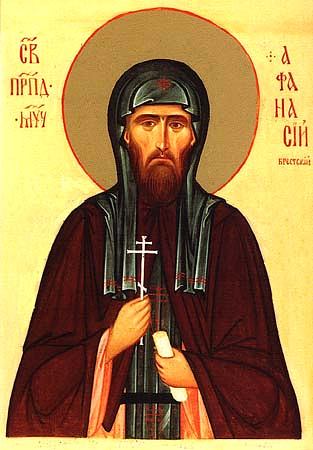 The MonkMartyr Athansii (Afanasii) of Bretsk was Belorussian and was born in about the year 1597 into a pious Christian family named Philippovich. He received a serious upbringing, and he knew the theological and historical literature, as is evidenced in the diary of the saint, which has been preserved. The MonkMartyr Athansii (Afanasii) of Bretsk was Belorussian and was born in about the year 1597 into a pious Christian family named Philippovich. He received a serious upbringing, and he knew the theological and historical literature, as is evidenced in the diary of the saint, which has been preserved.Martyrs Urban, Theodore, Medimnus, and 77 Companions at Nicomedia (370)The Martyrs Urban, Theodore, Medimnos and with them 77 Men of Churchly Rank suffered at Nikomedia during the reign of the Arian-heretic emperor Valentus (Valens) (364-378 or 379). Under this Arian heretic they banished from the Constantinople Church the Orthodox bishop Euagrios, and Christians not wishing to consort with this heresy were locked up into prison and subjected to various outrages. Having then been driven to the point of despair, the Orthodox Christians decided to petition protection from the emperor and they dispatched 80 chosen men of religious rank, headed by Saints Urban, Theodore and Medimnos.
Martyr Avdi (or Habib)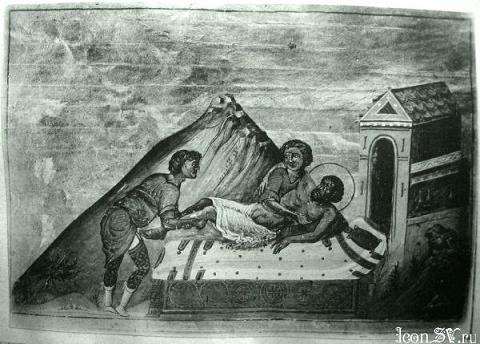 The Martyr Avdi (or Habib) suffered in Persia during the reign of the emperor Izdegerd I for his refusal to renounce Christ and instead worship the sun and fire. He died after tormenting tortures and until his final gasp he gave thanks to God, for blessing His chosen one to die for His Holy Name. The Martyr Avdi (or Habib) suffered in Persia during the reign of the emperor Izdegerd I for his refusal to renounce Christ and instead worship the sun and fire. He died after tormenting tortures and until his final gasp he gave thanks to God, for blessing His chosen one to die for His Holy Name. Martyr Sarbelus of Edessa
Martyrs Thiphael and his sister, Thivea (or Vivea) (98-138)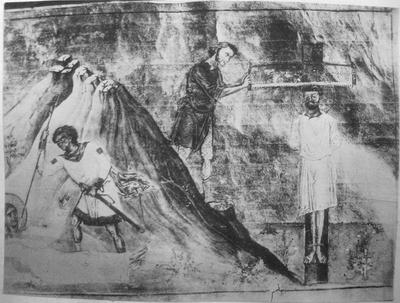 The Martyrs Thiphael and his sister Thivea (or Vivea) (+ c. 98-138) suffered for their bold and effective preaching of Christianity among the pagans. After long and intense torture the pagans suspended the holy Martyr Thiphael on a tree and cut at him with a saw, and his sister the Martyr Thivea they killed with a spear thrust in the neck. The Martyrs Thiphael and his sister Thivea (or Vivea) (+ c. 98-138) suffered for their bold and effective preaching of Christianity among the pagans. After long and intense torture the pagans suspended the holy Martyr Thiphael on a tree and cut at him with a saw, and his sister the Martyr Thivea they killed with a spear thrust in the neck.Virgin-martyr Rhais (Raisa) of Alexandria (308)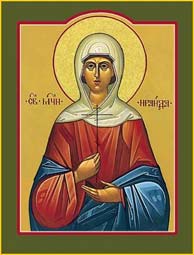 She was an Egyptian maiden, variously called Irais, Rais and Raida. One day, while drawing water from a well near the sea, she saw a ship laden with Christians being taken by their pagan persecutors to torture and death. By God's grace, Irais was touched by a desire to suffer for the Lord. She went to the ship, confessed herself to be a Christian, and was immediately taken prisoner with the other servants of Christ. They were all taken to the Egyptian town of Antinopolis, where Irais was the first of the company to be beheaded. She was an Egyptian maiden, variously called Irais, Rais and Raida. One day, while drawing water from a well near the sea, she saw a ship laden with Christians being taken by their pagan persecutors to torture and death. By God's grace, Irais was touched by a desire to suffer for the Lord. She went to the ship, confessed herself to be a Christian, and was immediately taken prisoner with the other servants of Christ. They were all taken to the Egyptian town of Antinopolis, where Irais was the first of the company to be beheaded. |